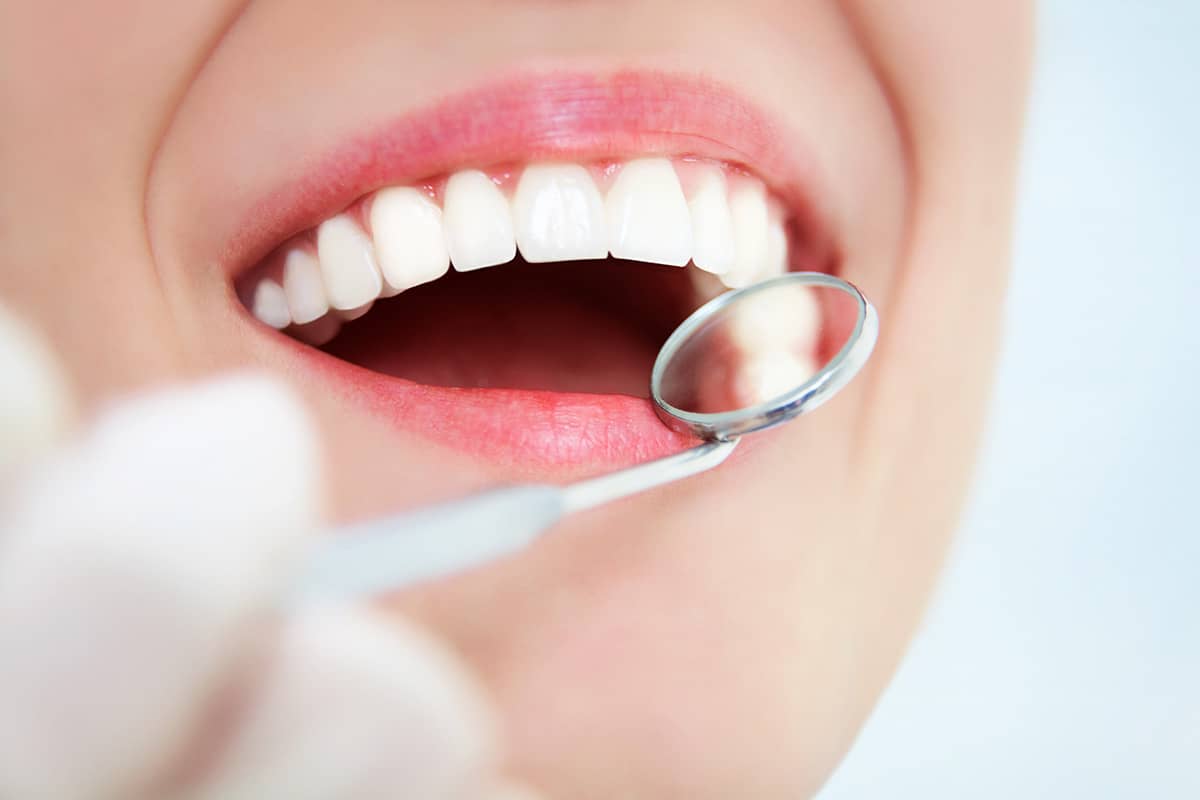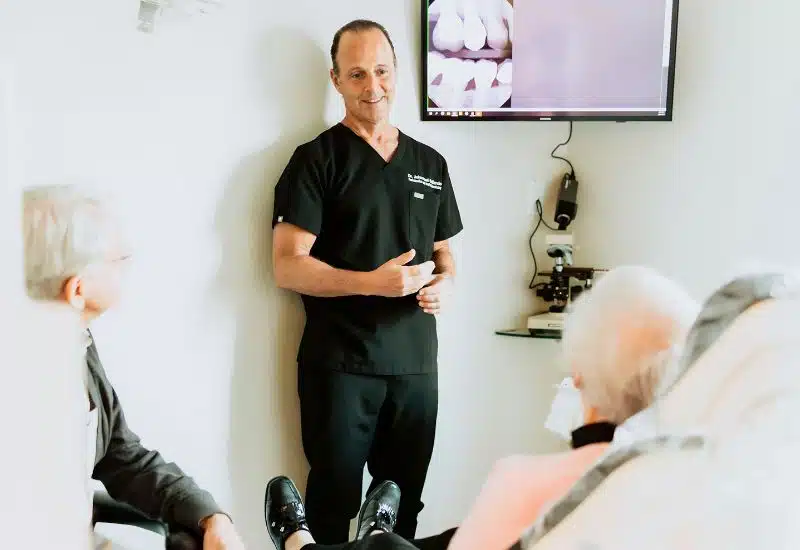
A general dentist provides essential services like cleanings, fillings, and regular check-ups, while a periodontist specializes in treating gum disease and the structures that support the teeth. Understanding the distinct roles of these dental professionals helps you choose the right specialist for maintaining a healthy smile.
Dr. Paul Gallardo is a Miami dental expert with knowledge in general dentistry and gum care. He helps patients make informed decisions about their oral health.
Choosing Between a Dentist and a Periodontist
- A general dentist provides routine dental care like cleanings, fillings, and basic oral health maintenance.
- A periodontist specializes in treating gum diseases and managing the structures that support the teeth.
- Both dentists and periodontists help maintain oral health, but periodontists have extra training in gum care.
- See a periodontist if you experience excessive gum bleeding, gum recession, or loose teeth.
- Periodontists receive additional education beyond dental school to focus on preventing and treating gum problems.
What is the Difference Between a General Dentist and a Periodontist?
General dentists handle a wide range of oral health needs, including recognizing cavities, gum disease, tooth decay, and infections. They provide restorative and preventive care such as cleanings, fluoride treatments, sealants, and X-rays to detect problems early.
Periodontists have advanced training focused on gum health and the structures that support teeth. They treat gum tissues, bone loss, and other issues related to gum disease with procedures like root planing, scaling, bone grafts, and tissue regeneration. Some periodontists also perform cosmetic procedures and place implants to restore missing teeth.
The table below highlights the key differences between a Dentist and a Periodontist to help you understand when to see each professional:
| Key Difference | Dentist | Periodontist |
|---|---|---|
| When to Visit | Routine cleanings, fillings, crowns, and minor gum concerns | Persistent gum disease, receding gums, loose teeth, or advanced oral surgery |
| Common Treatments Provided | Fillings, cleanings, root canals, crowns, bridges, extractions, implants, sealants, and X-rays | Scaling and root planing, bone grafts, tissue regeneration, dental implants, cosmetic gum procedures, laser therapy, pocket reduction surgery, gum grafts, and periodontal surgeries |
| Symptoms Addressed | Tooth decay, cavities, mild gum irritation | Gum bleeding, gum recession, loose teeth, severe gum infections |
| Ideal for | General dental checkups and resolving minor dental issues | Restoring oral health from complex gum problems or preparing for dental implants |
“When you notice receding gums, persistent bad breath, or loose teeth, a periodontist can provide expert care to restore your oral health.”
We are here to help!
Similarities Between General Dentists and Periodontists
Both dentists and periodontists have important roles in providing excellent oral health care to their patients by focusing on different aspects of dental health alongside one another. While they do have individual specialties they also share similarities in how they approach treatment for better oral hygiene with similar techniques such as deep cleanings or nonsurgical treatments if needed.
When Should Someone Transition from a Dentist to a Periodontist?
If you notice persistent gum bleeding, or receding gums, or have been diagnosed with advanced gum disease, it’s time to see a periodontist. They’re also the go-to experts for replacing missing teeth with dental implants or managing severe oral health issues.

Periodontal Treatments in Miami
With over 30 years of experience, Dr. Gallardo offers a comprehensive range of periodontal procedures to maintain and restore your gum health.
Education & Training Requirements

General Dentist Education and Training
General dentists complete a 4-year undergraduate degree followed by 4 years of dental school to earn a Doctor of Dental Medicine (DMD) or Doctor of Dental Surgery (DDS) degree. This training equips them with the skills needed to provide a wide range of dental care, including routine check-ups, cavity fillings, and preventive treatments to maintain overall oral health.

Periodontist Education and Training
Periodontists first complete the same 8 years of education as general dentists, earning a DMD or DDS degree. They then pursue an additional 2-3 years of specialized residency training focused on gum disease treatment, surgical procedures, and dental implant placement. This advanced training equips them with the expertise required to manage complex periodontal conditions and provide specialized gum care.
When it Becomes Necessary to Consult a Periodontist

1. Excessive Bleeding Gums
While bleeding gums can be normal, excessive bleeding and tenderness are signs of trouble. It’s possible to cause your gums to bleed if you use too much pressure while brushing or you don’t floss regularly. However, a buildup of tartar and plaque can cause irritation and bleeding (gingivitis), ultimately leading to gum disease.
2. Gum Recession
As you age, your gums can recede, exposing the nerves of the teeth. When the nerves are exposed, it can cause you extreme pain while brushing or eating hot or cold foods. A periodontist can perform a gum graft procedure to cover the nerves and alleviate the pain you are experiencing.
3. Loose Teeth
If you lose one or more teeth, you need to replace them with a bridge, dentures, or implants with crowns. Leaving the space open from a missing tooth ultimately leads to major problems like bone loss and gum recession. These cases often require expertise in dental implants and jawbone health to restore stability and prevent further complications.
When your gums are excessively irritated and inflamed, it can cause them to pull away from your teeth, allowing them to become loose. Adult teeth only become loose if there are major dental concerns. See your dentist right away if you notice a tooth is moving.

4. Bad Breath
Of course, everyone deals with bad breath when they first get up or after eating something potent. Chronic bad breath is much worse. No matter how much you brush, floss, or swish, the odor is pungent. Bacteria can collect on your gums and cause the foul smell to linger no matter what you do.
Healthy gums will not retain foul odors. If you have halitosis (bad breath) you are likely dealing with gum disease that must be treated ASAP.

5. Referred By a Dentist
If your dentist refers you to a periodontist, then you should go as soon as possible. You have reached a point in your dental care that requires the attention of a specialist. Your dentist will work closely with the periodontist to provide you optimal care. Once the treatment is completed, you’ll return to your general dentist for hygiene and regular check-ups as usual.
Talk to A Periodontist
It’s important to make an appointment with a trusted periodontist in Miami, FL if you are dealing with any symptoms of gum disease or have been referred by your dentist. Delaying treatment can cause you to lose teeth and need more expensive treatments later on.
Dr. John Paul Gallardo is a renowned, award-winning periodontist in the Miami area with over 30 years of experience. He offers advanced, cutting-edge treatments and specializes in dental implants. To schedule an appointment, call 305-447-1447 today.
Common Questions About Dentists vs Periodontists
Yes, general dentists can perform periodontal maintenance for mild gum issues or after initial treatment. However, for advanced gum disease or complex cases, a periodontist is better equipped to provide specialized care. Dentists often refer patients to periodontists for ongoing management of severe conditions.
Periodontists might seem more costly for advanced procedures due to their specialized training. However, addressing complex issues early can save money in the long run by preventing further complications.
In most cases, you don’t need a referral to see a periodontist, but many patients are referred by their dentists when their gum health requires specialized care.
Yes, both dentists and periodontists can place dental implants. However, periodontists have specialized training to handle more complex cases involving gum and bone health, ensuring optimal implant success.
Scheduling a consultation is easy. Contact Gallardo Periodontics and Implant Dentistry through our website or call our office directly. Our friendly staff will assist you in setting up an appointment that fits your schedule.